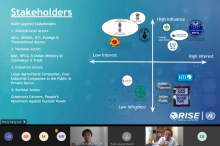Displaying 41 - 50 of 63
National Experts in Cameroon Propose Practical Ways to Integrate Gender Perspectives into Policies to Combat Small Arms Proliferation
From 31 May to 3 June 2021, the United Nations Regional Center for Peace and Disarmament in Africa (UNREC) conducted a training for 45 governmental and civil society representatives on the topic of gender and small arms control in Yaoundé, Cameroon. This was the third in a series of trainings as part of a global project in support of gender mainstreaming policies, programmes and actions in the fight against small arms trafficking and misuse, in line with the Women, Peace and Security agenda, funded by the European Union. Throughout the training, which was covered widely…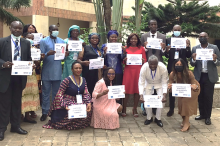
UNODA holds virtual onboarding sessions for experts and laboratories nominated to the roster for the Secretary-General’s Mechanism for Investigation of Alleged Use of Chemical or Biological Weapons (UNSGM)
Last week, the United Nations Office for Disarmament Affairs (UNODA) concluded a series of virtual onboarding sessions for qualified experts, expert consultants, and points of contact for analytical laboratories nominated by their Governments to the roster for the United Nations Secretary-General’s Mechanism (UNSGM) for the investigation of alleged use of chemical, biological and toxin weapons. Over the course of the sessions, participants learned about the background and mandate of the UNSGM, the different roles and expectations of the respective roster categories, the…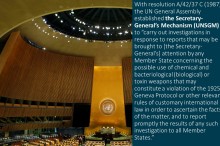
UNRCPD trains government officials in Asia and Pacific on national reporting on Small Arms and Light Weapons
On 28 May 2021, the United Nations Regional Centre for Peace and Disarmament in Asia and the Pacific (UNRCPD) conducted an online training on national reporting on the UN Programme of Action on small arms (UN PoA) for government officials from eight Member States in Asia and the Pacific, in preparation for the upcoming Seventh Biennial Meeting of States (BMS7). In the context of the UN Programme of Action and its International Tracing Instrument (ITI), designed to combat the illicit trade in small arms and light weapons, States have agreed to submit national reports…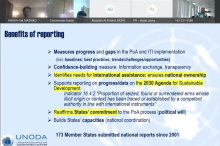
Mongolia makes progress towards national implementation action plan for resolution 1540 (2004)
Last month, the Government of Mongolia, the United Nations Office for Disarmament Affairs’ Regional Centre for Peace and Disarmament in Asia and the Pacific (UNRCPD) and the Organization for Security and Co-operation in Europe (OSCE), in cooperation with the Security Council Committee established pursuant to resolution 1540 (2004) (the 1540 Committee), hosted a virtual round-table exercise with the aim to strengthen Mongolia’s national efforts to implement UN Security Council resolution 1540 (2004) on the non-proliferation of weapons of mass destruction to non-State…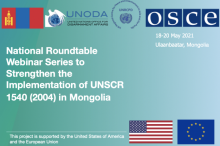
Young disarmament and arms control experts make their voices heard
In the months before States across the world convene for a conference to advance the elimination and non-proliferation of nuclear weapons, a number of next-generation experts delivered practical and actionable proposals to achieve a world free from the threat of nuclear weapons. On 31 March, the United Nations Office for Disarmament Affairs (UNODA) and BASIC organized a webinarhighlighting the voices of young professionals in the field of disarmament and nonproliferation entitled “The Tenth NPT Review Conference: Empowering Emerging Voices.” More than 150 participants…
New tool to track gender-responsive small arms control in the Democratic Republic of Congo
The United Nations Regional Centre for Peace and Disarmament in Africa (UNREC) entered the second phase of its training programme on gender and small arms control in the Democratic Republic of Congo (DRC). Together with the small arms National Commission (CNC-ALPC), and in collaboration with the United Nations Mine Action Service in the DRC, UNREC supported the development of a gender-sensitive monitoring and reporting mechanism to track the implementation of the country’s national action plan (NAP) on small arms control and armed violence reduction. The tool makes…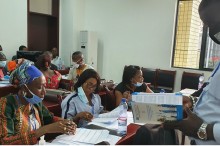
King’s College London to host webinar in collaboration with ODA to mark the 30th anniversary of UNSCOM
This month marks the 30th anniversary of the foundation of the United Nations Special Commission (UNSCOM), which was set up by the United Nations Security Council to oversee the elimination of Iraq’s weapons of mass destruction after the first Gulf War. To commemorate the event, King’s College London, in collaboration with the Office for Disarmament Affairs, will host a virtual webinar to reflect on UNSCOM’s unique work and achievements, with a particular focus on its biological weapons work. A panel of international experts will also consider how UNSCOM’s experiences…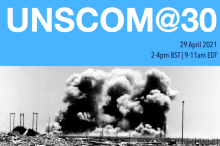
One year after UN’s call for global ceasefire, young leaders take stock
The first anniversary of the United Nations Secretary-General’s appeal for a global ceasefire during the pandemic, 23 March 2021, provided an opportune moment to take stock of current efforts and opportunities to promote peace, security and development. In that spirit, young peacebuilders and advocates for the UN’s Sustainable Development Goals gathered virtually to learn about the relationship between armed violence and sustainable development, opportunities to rethink excessive military spending in support of the 2030 Agenda for Sustainable Development, and…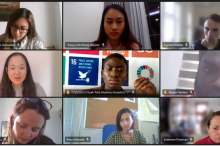
Nuclear-arms-control experts push to bring gender equality to their work
As countries gear up to hold a major meeting on eliminating and preventing the spread of nuclear weapons, United Nations experts are eyeing a future where women and men have equal representation in such talks. On 6 April, the United Nations Office for Disarmament Affairs (UNODA) and the United Nations Institute for Disarmament Research (UNIDIR) held a webinar entitled “The Tenth NPT Review Conference: Integrating Gender Perspectives Into the NPT Review Process-Towards an Equal and Secure Future.” More than 100 participants attended the online event, held in advance…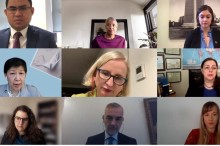
Students pitch tech-based ideas for tackling peace and security challenges
Students across the Asia-Pacific region recently met with experts from a range of fields to discuss risks to international peace and security from emerging technologies – and to develop their own technology-based approaches to overcoming these challenges. The discussions took place over four days of virtual workshops held as part of the “Responsible Innovation for a Secure Environment” (RISE) project, organized by the Office for Disarmament Affairs (ODA) and its regional centre for Asia and the Pacific (UNRCPD) in partnership with Singapore University of Technology…